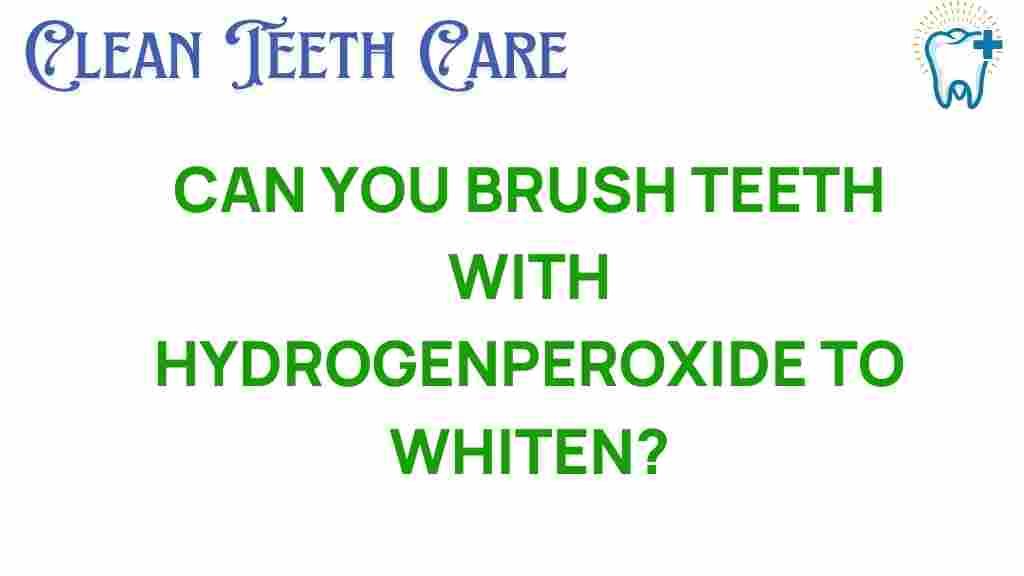Unveiling the Truth: Can Hydrogen Peroxide Whiten Your Teeth?
When it comes to achieving a bright, white smile, many people are on the lookout for effective teeth whitening solutions. Among the various products and methods available, hydrogen peroxide has gained considerable attention as a potential teeth whitening agent. But can hydrogen peroxide truly whiten your teeth? In this article, we will explore the facts about hydrogen peroxide, its effectiveness in teeth whitening, safety concerns, and how it fits into your overall dental hygiene and oral care routine.
Understanding Hydrogen Peroxide
Hydrogen peroxide is a chemical compound with the formula H2O2. It is commonly used as a disinfectant, antiseptic, and bleaching agent. In the context of oral care, hydrogen peroxide is often touted for its whitening properties due to its ability to break down stains on the enamel of the teeth.
Before diving into teeth whitening techniques, it’s essential to understand how hydrogen peroxide works to remove stains:
- Oxidation Process: Hydrogen peroxide releases oxygen molecules when applied to the teeth. This oxidation process helps to break down tough stains, making them easier to remove.
- Altering Color: By penetrating the enamel, hydrogen peroxide can alter the color of the teeth on a molecular level, resulting in a whiter appearance.
Effective Methods for Using Hydrogen Peroxide for Teeth Whitening
If you’re considering using hydrogen peroxide as a teeth whitening solution, it’s crucial to follow safe methods to protect your enamel and overall oral health. Here’s a step-by-step guide to using hydrogen peroxide for teeth whitening:
Method 1: Hydrogen Peroxide Mouthwash
This is one of the simplest methods for incorporating hydrogen peroxide into your oral care routine:
- Choose the Right Concentration: Use a 3% hydrogen peroxide solution, which is safe for oral use.
- Mix with Water: Combine equal parts of hydrogen peroxide and water in a cup.
- Swish and Gargle: Swish the solution in your mouth for about 30 seconds, making sure to cover all areas of your teeth.
- Spit and Rinse: Spit out the solution and rinse your mouth thoroughly with water.
- Frequency: Limit this treatment to 2-3 times a week to avoid enamel erosion.
Method 2: Hydrogen Peroxide and Baking Soda Paste
This method combines the whitening effects of hydrogen peroxide with the gentle abrasiveness of baking soda:
- Mix Ingredients: In a small bowl, mix one tablespoon of baking soda with enough hydrogen peroxide to form a paste.
- Apply the Paste: Using a toothbrush, apply the paste to your teeth, focusing on stained areas.
- Brush Gently: Brush your teeth for about 2 minutes, then rinse thoroughly with water.
- Usage: Use this paste no more than once a week to prevent damage to your enamel.
Safety Considerations When Using Hydrogen Peroxide
While hydrogen peroxide can be effective for teeth whitening, it is essential to consider safety to protect your dental hygiene:
- Concentration Levels: Always use a 3% hydrogen peroxide solution for oral care. Higher concentrations can cause irritation and damage to the gums and enamel.
- Limit Usage: Avoid frequent use of hydrogen peroxide for whitening, as overuse can lead to enamel erosion and increased tooth sensitivity.
- Consult Your Dentist: Before starting any whitening regimen, it’s wise to consult with your dentist, especially if you have existing dental issues.
Natural Remedies for Teeth Whitening
If you prefer more natural remedies for whitening your teeth, consider the following options:
- Activated Charcoal: This natural absorbent can help remove stains from teeth. Brush gently with activated charcoal powder, then rinse thoroughly.
- Coconut Oil Pulling: Swishing coconut oil in your mouth can help remove bacteria and may contribute to a whiter smile.
- Strawberries: Mashing strawberries and applying them to your teeth can provide a natural whitening effect due to their malic acid content.
Common Troubleshooting Tips
When using hydrogen peroxide for teeth whitening, you might encounter some issues. Here are some troubleshooting tips:
- Tooth Sensitivity: If you experience sensitivity, reduce the frequency of use and consult your dentist.
- Gum Irritation: If you notice irritation, stop using hydrogen peroxide immediately and rinse your mouth with water.
- No Visible Results: Results can vary based on the severity of stains. Consider professional whitening treatments if home remedies do not yield results.
Maintaining Oral Health and Dental Hygiene
Regardless of the whitening method you choose, maintaining good dental hygiene is crucial for oral health. Here are some tips:
- Brush Twice Daily: Use fluoride toothpaste and brush your teeth at least twice a day.
- Floss Daily: Flossing helps remove plaque and food particles that can contribute to staining.
- Regular Dental Checkups: Visit your dentist every six months for cleanings and checkups to keep your teeth healthy and white.
Conclusion
In conclusion, hydrogen peroxide can be an effective agent for teeth whitening when used safely and correctly. It is essential to follow safe methods and maintain good dental hygiene practices to protect your enamel and overall oral health. While hydrogen peroxide can help reduce stains and brighten your smile, it’s always best to consult with a dental professional if you’re unsure about the best approach for your teeth whitening needs.
If you’re looking for more information on dental hygiene and oral care, check out this comprehensive guide to maintaining oral health. For professional whitening options, consider consulting your dentist or researching professional teeth whitening treatments available in your area.
This article is in the category Treatments and created by CleanTeethCare Team
